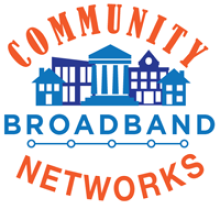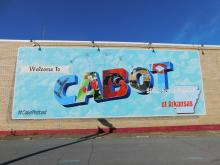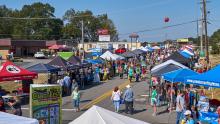
This is the transcript for episode 243 of the Community Broadband Bits podcast. Mel Coleman, the president of the National Rural Electric Cooperative Association and the CEO of the North Arkansas Electric Cooperative, explains how electric co-ops can provide high-quality, high-speed Internet service to their rural members. Listen to this episode here.
Mel Coleman: It is on fire and I think it something that most co-ops will, at the very least, be looking at very strongly within the next year or two, if they're not already.
Lisa Gonzalez: This is Episode 243 of the Community Broadband Bits podcast from the Institute for Local Self-Reliance. I'm Lisa Gonzalez. This week Mel Coleman joins Christopher for a talk on high-quality connectivity in America offered by rural electric cooperatives. Mel is CEO of the North Arkansas Electric Cooperative and president of NRECA, the National Rural Electric Cooperative Association. The NRECA represents more than 900 consumer-owned, not-for-profit electric cooperatives, public power districts, and public utility districts in the US. Mel and Chris get into the purposes of the organization and how broadband has become such a growing interest for cooperative members. They also discuss the North Arkansas Electric Cooperative's new project to bring high-quality Internet access to its rural members with a phased approach. Mel shares information on their progress and their expectations. Learn more about the next project at naeci.com.
Christopher Mitchell: Hey, folks. This is Chris Mitchell, the host of Community Broadband Bits, and I just wanted to ask you if you could do us a real big favor to help us spread this show around, and that's to jump on iTunes or Stitcher, or wherever you found this show, and to give us a rating, give us a little review, particularly if you like it. If you don't like it so much, then maybe don't do that; but, if you're enjoying this show, please give us a rating and help us to build the audience a bit. Thanks.
Lisa Gonzalez: Now, let's get on with the discussion. Here are Christopher and Mel Coleman, CEO of the North Arkansas Electric Cooperative and president of NRECA.
Christopher Mitchell: Welcome to another edition of the Community Broadband Bits podcast. I'm Chris Mitchell, and today I'm speaking with Mel Coleman, the CEO of the North Arkansas Electric Cooperative and president of NRECA. Welcome to the show.
Mel Coleman: Hey. Glad to be here.
Christopher Mitchell: Mel, I think people have a general sense of what an electric co-op is, but tell us about NRECA, if you would.
Mel Coleman: Well, NRECA, the National Rural Electric Cooperative Association, is the national association that represents all electric co-ops. NRECA is based in Arlington, Virginia, 700 employees. If you go back to the inception of NRECA, it was to speak for us in Washington on Capitol Hill and to provide services to cooperatives. Today NRECA is one of the largest lobbies in Washington, DC, has a strong voice for not only rural electrification, but any issues that face rural America -- energy issues. Also NRECA is the organization that we use on a daily basis. For instance, all of our employees across the country -- some 45,000 -- have their retirement that NRECA manages for us and also our insurance programs. So, NRECA is a very large, diverse organization: all of that, plus research and technology, education and training, marketing, anything you would expect to see with a national association plus a lot more.
Christopher Mitchell: As you said, one other question about the association before we focus on your cooperative there in North Arkansas. I have a sense that about 10 years ago, maybe, almost no rural electric cooperative was probably doing fiber, in terms of offering service to residents or businesses. It seems like there's a lot more interest. Do you have a sense that this is a rapidly growing interest of your members?
Mel Coleman: Oh, absolutely, and I think you're absolutely correct. I would go one step further. If you're talking about delivering broadband to members, you don't have to go 10 years back. To the best of my knowledge, this has all come about in the last four or five years. A lot of us, and I know here at my cooperative, we've had a fiber network for a number of years, but it was the fiber backbone that connected our substations and our offices together and such as that. As far as a fiber network to deliver broadband to our members, yeah, that is something that has just really taken fire the last two or three years and is coming to fruition.
Christopher Mitchell: If you listen to people like Randy Klindt and Jon Chambers, you get a sense that it's not going to be very many years until almost every rural electric is doing this. Do you think that's the path we're on?
Mel Coleman: Well, I think it is. You can look back, the history of co-ops throughout the country. Some dive right in; some are a little more cautious, understandably so, and it may take three or four years for them to do it. The one thing about co-ops: we all work together, we all share ideas together. We call that cooperation among cooperatives. Yet, we are all individual, we are all unique, and we all serve the specific needs of our own membership. Those needs are different as we look at each of the 900-plus co-ops across the country. In our case here in North Arkansas, we've heard from our membership this is what they need; this is what they want, and we're moving in that direction. Some co-ops aren't quite there yet. This has become, in my opinion, the number one topic when co-ops get together, whether it's at a statewide meeting, whether it's two managers having dinner, or whether it's at the national association, or the educational topics at the training sessions, the number one topic that I hear today is broadband. So, it is on fire and I think it is something that most co-ops will, at the very least, be looking at very strongly within the next year or two, if they're not already.
Christopher Mitchell: Let's talk about North Arkansas, the electric cooperative, and specifically, just to get a sense of what it's like. I think a lot of people hear Arkansas. They think Ozarks. Now you have 36,000 members across seven counties. What's your territory like? I mean, is it rolling hills, mountains? What've you got?
Mel Coleman: We're in the hills of North Arkansas and we do serve the Ozark Mountains. We've got right at 35,000 meters. We serve four counties in North Arkansas, four major counties, and parts of three others. We're in a very rural area. We've got an average density of seven members per mile of line. There's lower densities and there's higher, so that's actually a pretty good density for us to work with. We're in a recreational part of Arkansas. We have a lot of lakes, and streams, and hunting, and fishing, and all that. We do have a pretty good amount of seasonal load here as well as the permanent residences and the industry. I like to say we're in God's country of Arkansas.
Christopher Mitchell: I find that interesting -- You've named your pilot projects dealing with the fiber for broadband to residents and businesses NEXT. Can you tell me a little bit about what NEXT is?
Mel Coleman: Well, many people, if you've grown up in rural electrification, you go back 80 years ago, and what we're doing today is no different than what happened 80 years ago with electricity. Nobody wanted to serve rural America. I don't knock the investor-owned business model; but, when you look at an investor-owned utility, the CEO gets up every day and his number one goal is to increase the stock price of his utility. That's fine. That's their business model. That is not our business model. So, when you go back 80 years ago, there was no money to be made in rural America with stringing of electric lines and poles. That's why co-ops were formed, to serve the farms at that time, primarily. That was all that existed in rural America. Today we see the same thing with broadband. It is the same thing. The business plan of the for-profit communications companies does not fit rural America, and that's fine. It does fit our business plan, because we are only interested in improving the quality of life of our membership. Now, NEXT -- There's a book called The Next Greatest Thing, where 80 years ago a man got up in a church in Tennessee and said, "The greatest thing is to have the love of God in your heart and the next greatest thing is to have electricity in your home." That's where NEXT comes from. We've taken that word 'next' out of that, and what we like to think is, "This is the next 'next greatest thing,'" and that is broadband in your home, true broadband.
Christopher Mitchell: How did this become a priority among your members or your board? I'm always curious. How did you make the leap from thinking, "This would be nice to have" to something that, "We're going to make it work in these pilot projects"?
Mel Coleman: Well, our board's 100% behind us. It's been a topic of discussion for the last year or so at just about every meeting that we attend. I'm good friends with Randy Klindt, Randy, of course, at Ozarks Electric in Arkansas. We started talking to Randy. We put together a Phase 1 project, and our board adopted that. That's where we are today. We're in the Phase 1 project. A very supportive board. They understand. They live out there in these rural areas, and they understand the need for broadband. They hear from our members as well as we do here in the company.
Christopher Mitchell: For the co-ops that aren't doing it, are they hearing less from their residents, or is there just actually a different demand, do you think? Is there something that sets you apart from co-ops that are not doing anything quite yet?
Mel Coleman: No, I don't think there is. Again, you've got differences between all co-ops; but, I think when you take a cross-section, our members are basically the same. Again, each co-op is going to make that individual decision, and I think you have, understandably so, some electric cooperatives that are going to be very careful, very conservative about how they roll this out, the maiden one. We've done this, too, on some of the projects that we've had over the years. We may want to step back and see what success other people are having first. So, I think that's definitely understandable, and all co-ops, I think, are going to have a different timetable.
Christopher Mitchell: Can you describe the plan that you're using to roll this out?
Mel Coleman: Well, we have actually been under way since mid to late last year. What we've got is a pilot project of approximately 1500 meters of what we are looking for and what we're at, I believe -- our goal -- of a 35% take rate. Again, we had a fiber backbone that the co-op owned, and it was already in place. So, what NEXT has been doing, what we've been doing, is putting up the feeder lines, and now we're in the process of installing the drops. The latest numbers that I saw to date: We have about 60 connected. We have somewhere in the neighborhood of 400 or so that are going to be connected. So, I'm very excited about where we are at the present. I think we've certainly got the demand. I know we've got the demand across the rest of the territory, because we hear from those folks all the time, "When are you coming to my area?" But, no, we're very pleased with where we are in this Phase 1.
Christopher Mitchell: This is something that's self-funded, right? You're not getting any support from anyone for this?
Mel Coleman: Correct. This is self-funded.
Christopher Mitchell: I guess a question would be, then, do you have a sense of what it will take, if you keep getting demand, to be able to build out to everyone? Is this something that you could ultimately do yourself, or will you need some form of a program that would help you to reach some of the more rural areas?
Mel Coleman: No. This is not something that we could fully fund all the way through. The plans are now to have five phases. That's not an issue. That's not a problem for us, but it is not something that we would be able to self-fund past Phase 1.
Christopher Mitchell: So, when you say, "not able to fund," does that mean that you would need to secure a loan or you would need kind of a grant, some sort of funding you would not have to pay back?
Mel Coleman: Both. Grant funding would certainly help. We know money has been there, dating back to the stimulus for broadband in America. Certainly we feel like that we should have a shot at that as well as anybody else. But, yeah, also loan funds, we'll have to have. We do have access to loan funds, but that's not going to be an issue for us.
Christopher Mitchell: You're building a gigabit network in these areas. You already have some fiber backbone, but how are you getting to Little Rock or someplace, where you can hand off and connect to the wider Internet?
Mel Coleman: Well, we're actually going to St. Louis. Salem is in North Arkansas, and we have specifically in our Phase 1 -- was not only a good cross-section of our membership, but we went north out of Salem to the Missouri line, which is about 20, 22 miles. We connected with a transmission provider in Missouri that already had fiber strung, and that is our connection to the outside world.
Christopher Mitchell: Let me give you a chance. Is there anything else I should have asked you about this project or your area?
Mel Coleman: Nope. We're really excited about it. Again, I think, as we look at this, it is very appropriate to say that this is the next 'next greatest thing' that our members really are ready for.
Christopher Mitchell: Great. I've actually made the case that I think it may be that the FDR administration does more to get high-quality Internet access out to the rural areas than any other administration, which is pretty remarkable.
Mel Coleman: Yeah, pretty remarkable, exactly.
Christopher Mitchell: All right. Well, thank you for your time to tell us what's going on and thanks for your great work down there.
Mel Coleman: Yes, sir. Thank you and have a great day.
Lisa Gonzalez: That was Christopher talking with Mel Coleman, CEO of the North Arkansas Electric Cooperative and president of NRECA. We have transcripts for this and other Community Broadband Bits podcasts available at MuniNetworks.org/broadbandbits. Email us at podcast@MuniNetworks.org with your ideas for the show. You can follow Chris on Twitter. His handle is @CommunityNets. You can also follow MuniNetworks.org stories on Twitter. The handle is @MuniNetworks. Subscribe to this podcast and all of the podcasts in the ILSR family on iTunes, Stitcher, or wherever else you get your podcasts. Never miss out on our original research. Subscribe to our monthly newsletter at ilsr.org. Thank you to Break the Bands for the Song, Escape, licensed through Creative Commons, and thanks for listening to Episode 243 of the Community Broadband Bits podcast.







